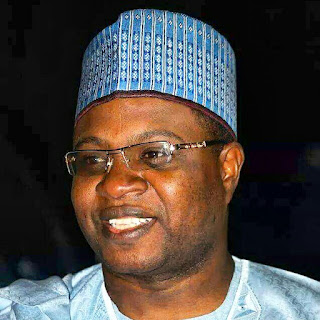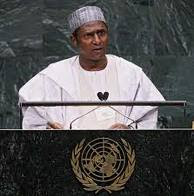2011 ELECTION PRIMARIES: Dirty War in PDP

Dr Okwesilieze Nwodo, PDP National Chairman
- Fears Over Return of ACP Lamurde to EFCC as Director of Operations
- We’re Against Campaign of Calumny -Professor Alkali
As concerns grow over the dirty campaigns between President Goodluck Jonathan and former Vice President Atiku Abubakar, the two major contenders for the Peoples Democratic Party (PDP) presidential ticket for next year’s polls, tongues have further begun to wag over three decisions being taken by the presidency, the National Assembly and the executives of the party.
Sunday Trust gathered that the PDP’s new timetable and schedule of activities for 2011 general elections were doctored by the National Caucus and the Board of Trustees of the party, the outcome of which has not gone down well with governors and some presidential aspirants.
The National Caucus consists of the President, Senate President and his deputy, Speaker of the House of Representatives and his deputy; Chairman of the Board of Trustees and some of his members; the Chairman and select members of the National Working Committee (NWC) of the PDP. On the other hand, the Board of Trustees is headed by former President Olusegun Obasanjo.
Our correspondent gathered that the two organs of the party altered the order of the primaries proposed by the NWC and replaced the staggered presidential primaries to a one-day event, based on a suspicion that one of the presidential aspirants had infiltrated delegates, and that some governors were not trusted, though they had pledged their loyalty to one of the presidential aspirants.
The new timetable obtained by Sunday Trust put the schedule of primaries as follows: House of Representatives primaries, January 3, 2011; Senatorial primaries, January 4, 2011; presidential primary in Abuja, January 9, 2011; governorship primaries January 12, 2011 and State Assembly primaries, January 13, 2011.Apart from the changes in the order of the primaries, the adjustment to the number of possible delegates in the Electoral Bill in the making in the National Assembly has been a source of concern. Former Vice President Atiku Abubakar’s campaign team had raised fears that the reduction in the number and caliber of party members to be considered as delegates would not deepen the country’s democracy.
However, speaking on the role of the National Assembly on the Electoral Bill, the Chairman of the House of Representatives Committee on Rules and Business, Ita Enang, told Sunday Trust that the issue was not concluded.
He said, “the job of the National Assembly was to make laws for the governing of the country, hence it was out of place for any party to accuse the lawmakers of conspiracy on matters within its purview.
He insisted that anyone who felt hurt by any law made by the National Assembly has the option of going to court to challenge that particular law.
The lawmaker explained that the bill on the Electoral Act before the National Assembly was a mere proposal which has just passed through second reading, hence it was premature for the public to say the National Assembly has done anything to generate tension in polity.
“The bill is not passed yet, in fact it is not debated yet because it is on Tuesday that the bill will pass through third reading. When the bill passes through third reading, it will be committed to the appropriate committee to continue their work on the bill and report to the House for debate and adoption and later go to the senate for concurrent before it can be forwarded for the president’s assent. Let me say that a bill before the house from the beginning to the end is still a proposal.”
He added that before a bill is passed, the public would be involved to ventilate their opinion on the proposal, adding that “the public have the right to adopt or reject it. I don’t think the lawmakers have done anything to generate tension in the country.”
Sunday Trust learnt further that some PDP governors were unhappy about the concession by the party’s leadership to grant automatic tickets to members of the National Assembly who indicate interest to return in 2011, and the plan to include them as members of the National Executive Committee of the PDP. As the party’s NEC meets on Tuesday, there are indications that these issues would dominate the agenda.
Furthermore, the redeployment of an Assistant Commissioner of Police, Ibrahim Lamurde, from the Police College, Kaduna to the commission as the Director of Operations, has raised suspicion, ahead of the primary elections.
Lamurde was the Director of Operations at the EFCC when Malam Nuhu Ribadu was Chairman. The duo, with their team, investigated some state governors who were suspected to have been involved in corrupt practices. It is feared that he may have been asked to return to the agency for political reasons.
A source told Sunday Trust that the decision for Lamurde to return to the EFCC was taken by the presidency without consulting the Chairman of the Commission, Mrs Farida Waziri. The spokesman of the EFCC declined to comment on it, but rather referred our reporter to an earlier statement in which the change of the Director of Operation was announced.
When contacted to explain the reason for the return of Lamurde to the EFCC, the Nigeria Police Force Public Relations Officer, Olusola Amure, told Sunday Trust that as far as he was concerned, it was a normal police transfer with no political motive.


Comments
Post a Comment